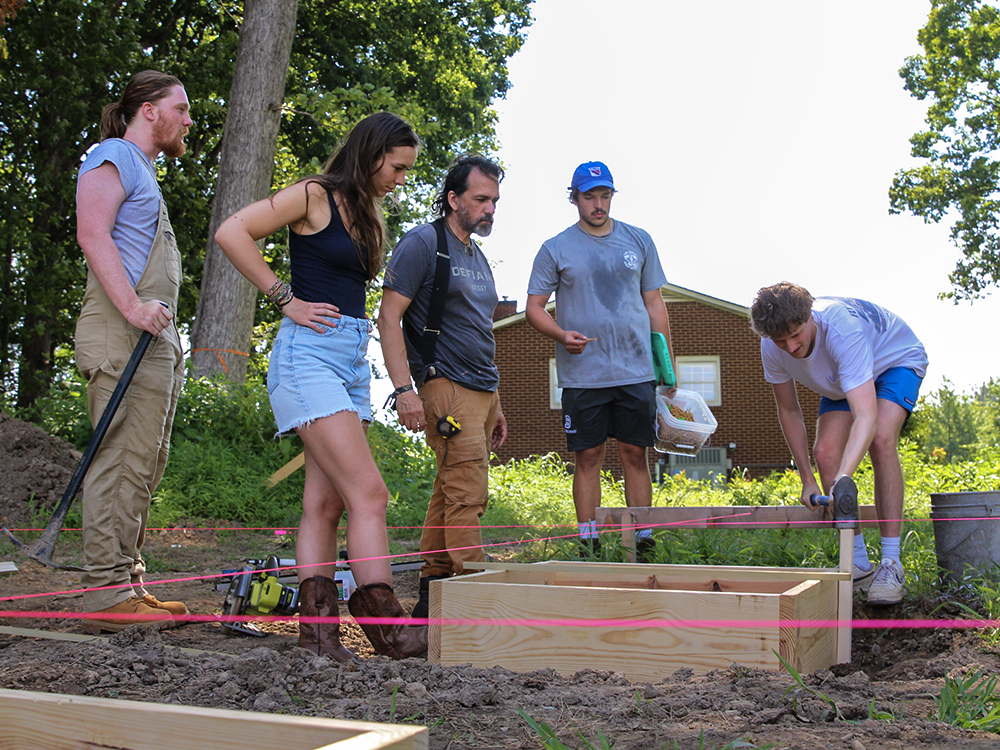Twelve sustainably designed homes will become the Loy Farm Living-Learning Community, a model of green architecture where students thrive by living harmoniously with nature. The LLC will open in fall 2024 with all 12 homes completed by fall 2025.
A team of student builders has broken ground on the first of 12 sustainable houses in what will become the Loy Farm Living-Learning Community, a showcase for sustainable architecture and dynamic student experience connected to Loy Farm.
With a first phase of six houses opening in fall 2024, the site at the farm’s eastern edge eventually will include housing for 24 students, a commons building and outdoor gathering spaces. The completed residential neighborhood will offer students an immersive educational experience in sustainable living, building and agricultural practices learned in environmental studies courses.
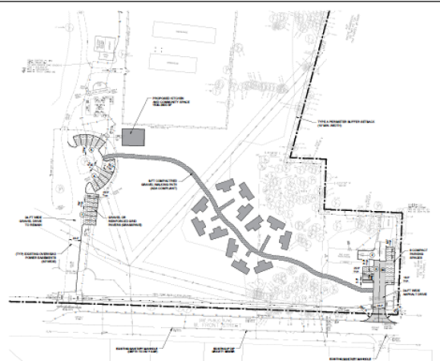
The project furthers the university’s mission for Loy Farm, home to the Center for Environmental Studies, as a hub of hands-on learning through horticulture, agriculture and research. Students in the living-learning community will be involved with planting and harvesting crops and maintaining the farm as well as the residential area. The LLC will enhance area resources for sustainable practices and broaden outreach opportunities for campus and broader communities.
“We’re already No. 1 in the nation for undergraduate teaching and having this living-learning community at the farm adds new dimensions to that. Our students will graduate with even more skills by living in this community and in this idyllic landscape,” said Robert Charest, associate professor and chair of the Department of Environmental Studies.
Students designed the first home with Charest and input from University Planning, Design and Construction Management. Charest is leading undergraduates in its construction this summer and throughout the 2023-24 academic year. The first 550-square-foot home will be constructed from steel and timber that students will fashion into beams. The home will be raised on piers and include two bedrooms, a full kitchen and common area, and a bathroom. A porch will provide outdoor living space.
“I must commend our administration for pursuing this vision. When we looked at precedents for this kind of community, we couldn’t find anything like it. This is a laboratory, and students are participating in building the laboratory. It is truly groundbreaking,” Charest said
The community’s 11 other homes will be designed and built by outside firms around different principles of sustainable design and construction. Each will be roughly 600 square feet and include two bedrooms, a shared bathroom and common areas for food preparation, living and gathering.
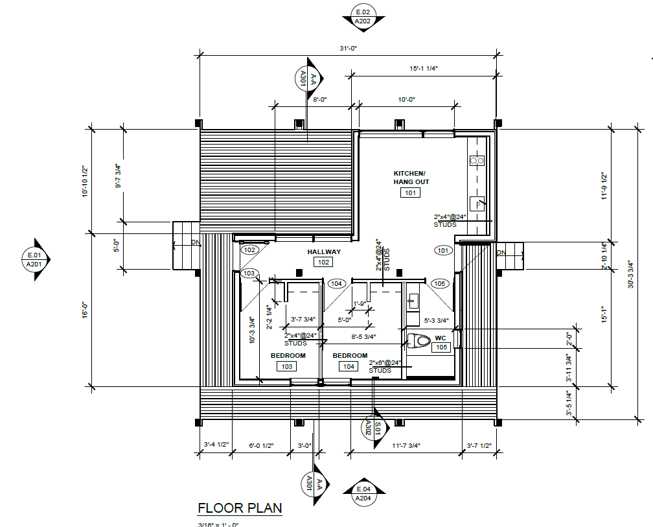
An existing brick ranch house next to the farm will be refurbished and converted into a commons building for student services, laundry and communal events.
“The addition of the living-learning community and common spaces will make Loy Farm even more of a research and educational farm where the campus community and outside community can come to learn about sustainable growing methods, sustainable architecture and view 12 different solutions to the same problem,” said Brad Moore, associate vice president for facilities and chief facilities officer. “It will be illuminating to see those architectural solutions juxtaposed next to each other with the richness of the architectural variety.”
Students will apply to live in this unique LLC having demonstrated their commitment to environmental sustainability through coursework and service at Loy Farm. Residents will be expected to contribute to the well-being and care of the community. Faculty and student advisors will guide activities and outreach.
Environmental studies faculty have long envisioned a residential community at the farm where students would apply classroom lessons to tending the farm and living out sustainable principles.
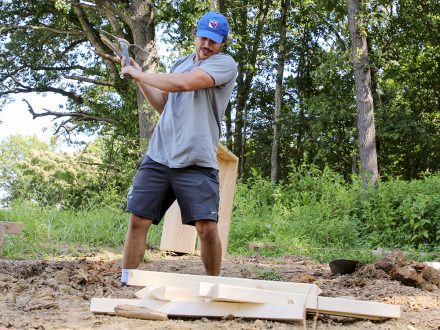
Michael Strickland, lecturer in environmental studies and English and director of the Center for Environmental Studies, said the LLC is “a culmination of the vision we’ve had and what we’ve worked for steadily all these years.” He believes it will add vibrance to campus life through a highly competitive residential community and create new opportunities for experiential learning unavailable at most institutions.
“This LLC expands the Center’s mission of keeping in the forefront of students’ and faculty’s minds that sustainable living is achievable, but that it takes vigilance and constant evolution,” Strickland said. “Not only is this a model of sustainability, but it will be a hands-on, immersive experience for our students in learning practical life skills — like using tools to maintain a home and landscape and mastering the complexities of farm and gardening work — fostering self-reliance, grit, resilience and care for the community.”
Elon University acquired Loy Farm from the Loy family in 2000, eventually becoming a hub for agroecology courses on a half-acre farm. It has since grown to include two high tunnels and propagation spaces, expanded perennial and annual crops and a barn that functions as an indoor/outdoor classroom. Full-time staff oversee planting and harvests — which supply Harvest Table campus dining, Elon’s Campus Kitchen, and Allied Churches of Alamance
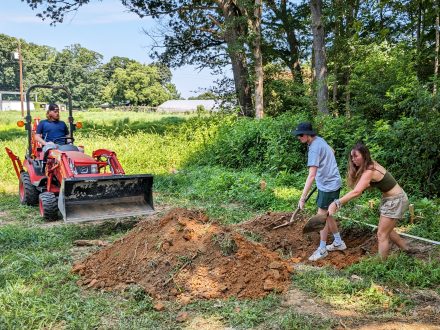
County’s food kitchen with produce — serving as an example of sustainable, equitable food systems in the South.
Design and construction of the LLC is already enriching Elon students’ experiential learning.
Karalyne Dube ’23 was an assistant architectural designer with Charest during her senior year. This fall, Dube will enroll at the Platt Institute in Brooklyn to pursue a master’s in architecture, and the work she submitted from Elon’s sustainable design courses put her ahead in the application process.
“The most exciting thing to me about this process was seeing students so inspired to continue this work in the future,” Dube said. So many architects design sketches but rarely see them come to life. I can’t describe that feeling, and I want to repeat this process and see my work benefit my community and the environment.”
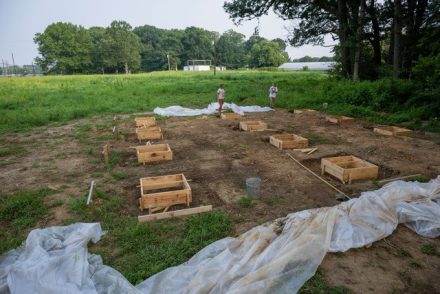
Kyra Wells ’24 is a member of the summer team that broke ground and is completing the first phase of construction.
“We’re not shadowing anyone. We’re the ones who are building it, and we’re learning firsthand from Prof. Charest, who’s so experienced,” Wells said. “It’s exciting and empowering.”



